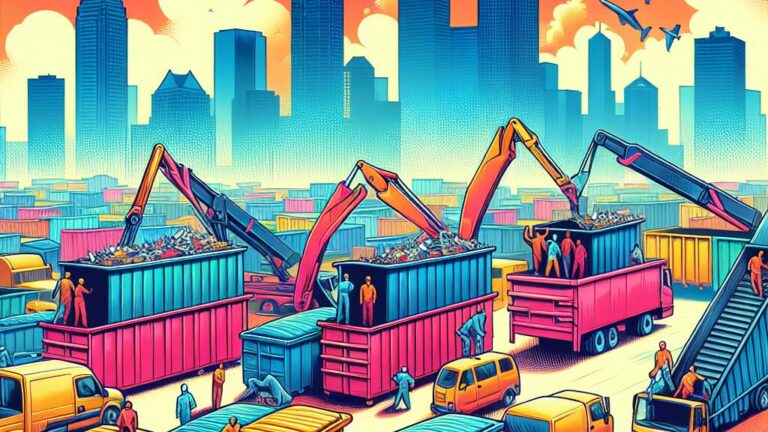10 Tips for Using Roll-off Dumpsters Effectively
Safety Precautions When Using Dumpsters
When using a roll-off dumpster, it is crucial to prioritize safety to prevent accidents. Always wear appropriate personal protective equipment, such as gloves and steel-toed boots, to safeguard yourself from sharp or heavy objects. Additionally, maintain a clear area around the dumpster to avoid tripping hazards and ensure that everyone involved in the operation knows the safety protocols in place.
Be mindful of the weight limits outlined by the rental company. Overloading a dumpster can lead to dangerous situations, including potential collapse or spillage during transport. Always follow any specific loading guidelines provided by the rental service and distribute weight evenly throughout the container. By adhering to these basic precautions, you can create a safer environment for yourself and those around you while managing your waste efficiently.
Essential Guidelines to Protect Yourself
When using a roll-off dumpster, it is crucial to prioritize your safety by wearing appropriate personal protective equipment. Hard hats can shield your head from falling debris, while gloves protect your hands from sharp objects. Sturdy footwear, ideally steel-toed boots, prevents injuries from heavy items being loaded or dropped. Additionally, goggles can safeguard your eyes from dust and flying particles during the loading process. Understanding the risks associated with handling construction materials or large household items will help you stay alert and reduce the chance of accidents.
Equally important is maintaining a clear area around the dumpster. Keeping the space free of obstacles allows for better movement and reduces the risk of trips and falls. Ensure that you use proper lifting techniques when handling bulky materials to avoid strains or injuries. Consider asking for assistance when dealing with particularly heavy or awkward objects. Communication with any helpers or team members enhances safety and ensures that everyone is aware of their roles while managing the dumpster materials.
Calculating Rental Costs
When considering the rental of a roll-off dumpster, it’s crucial to understand the various factors that contribute to the overall cost. Rental prices can vary based on the size of the dumpster, the duration of the rental, and the specific company you choose. Larger dumpsters typically come with a higher price tag, while smaller sizes may fit your needs at a more economical rate. Additionally, many companies implement a tiered pricing structure based on the number of days you’ll keep the unit, so planning your project timeline can lead to cost savings.
Another significant aspect impacting dumpster rental costs is the weight of the materials you intend to dispose of. Most rental agreements include a weight limit, and exceeding this limit can result in additional fees. The type of waste also matters; hazardous materials may require special handling, leading to higher charges. Be sure to inquire about any extra fees for exceeding weight limits or for disposal of certain types of waste to avoid any surprises on your final bill.
Factors That Influence Dumpster Pricing
Several key elements determine the cost of renting a roll-off dumpster. The size of the dumpster plays a significant role, with larger containers typically incurring higher fees due to increased capacity. The type of materials being disposed of also affects pricing, as hazardous waste or specific construction debris may require special handling, leading to additional charges.
The rental duration can impact the overall cost as well. Most companies provide a standard rental period, with extra fees for extended use. Moreover, local disposal fees or landfill rates can vary by region, influencing how much you will ultimately pay. Understanding these factors can help in budgeting and planning for a dumpster rental efficiently.
Understanding Local Regulations
Local regulations govern the use of roll-off dumpsters, ensuring safety and order within neighborhoods. It is essential to familiarize yourself with your city or municipality’s guidelines regarding dumpster placement, duration, and permitted materials. Some areas mandate the use of permits for dumpster rentals, which may require notifying local authorities about your plans. Ignoring these regulations can lead to fines or complications during your project.
Consider checking with your local waste management department to understand what specific rules apply to your situation. Each jurisdiction may have different limitations regarding where you can place the dumpster, such as proximity to driveways and sidewalks. Additionally, understanding the types of waste allowed in your dumpster is crucial to avoid penalties. By adhering to local ordinances, you can ensure a smoother rental experience and contribute to community compliance.
Compliance with Ordinances and Permits
Understanding local regulations is essential when renting a roll-off dumpster. Various municipalities require permits for placing dumpsters on public property, including streets or sidewalks. Failing to secure the necessary permits may lead to fines or the immediate removal of the dumpster. To avoid complications, check with your local city or county office for specific requirements concerning dumpster rentals.
In addition to permits, it is important to comply with disposal regulations. Many areas have restrictions on what can be thrown into dumpsters, including hazardous materials or specific electronic waste. Familiarizing yourself with these guidelines will not only prevent legal issues but also promote responsible waste management. Taking these considerations into account ensures a smoother process when renting and using a roll-off dumpster for your project.
Tips for Loading Bulk Materials
When loading bulk materials into a roll-off dumpster, it is essential to distribute the weight evenly to prevent shifting during transport. This means placing heavier items at the bottom and lighter materials on top. Organizing the load can help maximize the available space and ensure that the dumpster does not exceed weight limits. Using tools like a shovel or rake can assist in breaking down larger items to make the loading process easier and more efficient.
It’s important to consider the type of materials being loaded. For instance, when dealing with construction debris, larger pieces should be cut down to size if possible. This not only optimizes space but also minimizes potential hazards. Keeping hazardous materials separate and ensuring they are disposed of properly is crucial for safety and compliance with local disposal regulations.
Strategies for Efficiently Handling Heavy Items
When working with heavy items, it’s essential to assess their weight and size before lifting. Utilize proper lifting techniques to prevent injury. Bend at the knees, keep the back straight, and lift with the legs. If possible, use tools such as dollies or hand trucks to assist in moving bulkier materials. These tools can significantly reduce the strain on the body and make the process more efficient.
Organizing the loading area can facilitate easier handling of heavy items. Staging the materials close to the dumpster allows for quick and efficient transfers. It’s advisable to load heavier materials first, ensuring a stable base. This technique helps maintain balance within the dumpster, preventing shifts that can lead to dangerous situations. Consider enlisting help from others to manage the load safely, ensuring everyone involved understands the plan for handling the materials.
FAQS
What is a roll-off dumpster?
A roll-off dumpster is a large, open-top container that is delivered to a location for the purpose of collecting waste and debris. It is typically used for construction, renovation, or large clean-out projects and can be transported on and off a property using a specialized truck.
How do I choose the right size dumpster for my project?
To choose the right size dumpster, consider the volume of waste you anticipate generating. Most rental companies offer a range of sizes, from small 10-yard dumpsters for minor cleanouts to larger 40-yard dumpsters for major renovations. It’s often helpful to consult with the rental company for guidance based on your specific needs.
Are there items that I cannot put in a roll-off dumpster?
Yes, there are restrictions on certain items that cannot be placed in a roll-off dumpster, including hazardous materials (like chemicals and batteries), electronics, tires, and certain appliances. It’s important to check with your rental company for a complete list of prohibited items to ensure compliance with local regulations.
How long can I keep a roll-off dumpster?
The rental duration for a roll-off dumpster can vary based on the rental agreement, but it typically ranges from a few days to a couple of weeks. If you need the dumpster for a longer period, it’s usually possible to arrange for an extension with the rental company.
What should I do if my dumpster is full before my project is finished?
If your dumpster is full before you’ve completed your project, you can contact the rental company to schedule a pick-up and replacement. Some companies offer “swap-out” services where they will exchange your full dumpster for an empty one, allowing you to continue working without significant delays.







